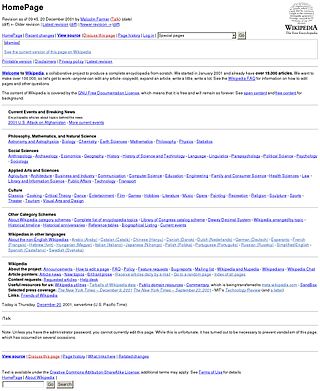
Wikipedia, a free-content online encyclopedia written and maintained by a community of volunteers known as Wikipedians, began with its first edit on 15 January 2001, two days after the domain was registered. It grew out of Nupedia, a more structured free encyclopedia, as a way to allow easier and faster drafting of articles and translations.

Jimmy Donal "Jimbo" Wales is a British-American Internet entrepreneur, webmaster, and former financial trader. He is a co-founder of Wikipedia and the for-profit wiki hosting service Fandom. He has worked on other online projects, including Bomis, Nupedia, WikiTribune, and WT Social.
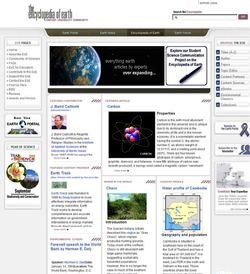
The Encyclopedia of Earth is an electronic reference about the Earth, its natural environments, and their interaction with society. The Encyclopedia is described as a free, fully searchable collection of articles written by scholars, professionals, educators, and other approved experts, who collaborate and review each other's work. The articles are written in non-technical language and are intended to be useful to students, educators, scholars, and professionals, as well as to the general public. The authors, editors, and even copy editors are attributed on the articles with links to biographical pages on those individuals.
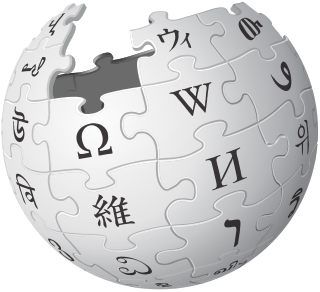
Wikipedia is a free content online encyclopedia written and maintained by a community of volunteers, known as Wikipedians, through open collaboration and the use of the wiki-based editing system MediaWiki. Wikipedia is the largest and most-read reference work in history. It is consistently ranked as one of the ten most popular websites in the world, and as of 2024 is ranked the fifth most visited website on the Internet by Semrush, and second by Ahrefs. Founded by Jimmy Wales and Larry Sanger on January 15, 2001, Wikipedia is hosted by the Wikimedia Foundation, an American nonprofit organization that employs a staff of over 700 people.
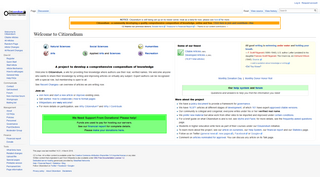
Citizendium is an English-language wiki-based free online encyclopedia launched by Larry Sanger, co-founder of Nupedia and Wikipedia.

Scholarpedia is an English-language wiki-based online encyclopedia with features commonly associated with open-access online academic journals, which aims to have quality content in science and medicine.

The Cult of the Amateur: How Today's Internet Is Killing Our Culture is a 2007 book written by entrepreneur and Internet critic Andrew Keen. Published by Currency, Keen's first book is a critique of the enthusiasm surrounding user-generated content, peer production, and other Web 2.0–related phenomena.
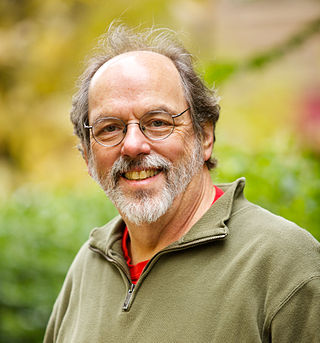
The history of wikis began in 1994, when Ward Cunningham gave the name "WikiWikiWeb" to the knowledge base, which ran on his company's website at c2.com, and the wiki software that powered it. The wiki went public in March 1995, the date used in anniversary celebrations of the wiki's origins. c2.com is thus the first true wiki, or a website with pages and links that can be easily edited via the browser, with a reliable version history for each page. He chose "WikiWikiWeb" as the name based on his memories of the "Wiki Wiki Shuttle" at Honolulu International Airport, and because "wiki" is the Hawaiian word for "quick".

Veropedia was a free, advertising-supported online encyclopedia launched in late October 2007. It was taken down in January 2009, pending creation of a new version.
"Ignore all rules" (IAR) is a policy used on Wikipedia, an online encyclopedia. The English Wikipedia policy reads: "If a rule prevents you from improving or maintaining Wikipedia, ignore it." [emphasis in original]. The rule was proposed by Wikipedia co-founder Larry Sanger to encourage editors to add information without focusing excessively on formatting, though Sanger later criticized the rule's effects on the community.

The Wikimedia Foundation, Inc., abbreviated WMF, is an American 501(c)(3) nonprofit organization headquartered in San Francisco, California, and registered there as a charitable foundation. It is best known as the host of Wikipedia, the seventh most visited website in the world. However, the foundation also hosts 14 other related content projects. It also supports the development of MediaWiki, the wiki software that underpins them all.
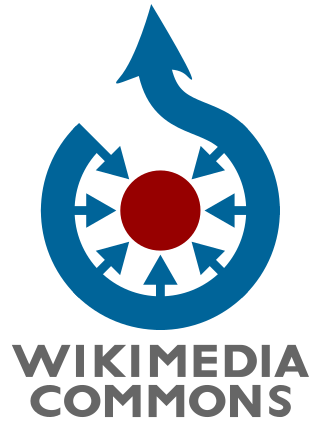
Wikimedia Commons, or simply Commons, is a wiki-based media repository of free-to-use images, sounds, videos and other media. It is a project of the Wikimedia Foundation.
Deletionism and inclusionism are opposing philosophies that largely developed within the community of volunteer editors of the online encyclopedia Wikipedia. The terms reflect differing opinions on the appropriate scope of the encyclopedia and corresponding tendencies either to delete or to include a given encyclopedia article.

Bomis (, from Bitter Old Men in Suits, was a dot-com company best known for supporting the creations of free-content online-encyclopedia projects Nupedia and Wikipedia. It was co-founded in 1996 by Jimmy Wales, Tim Shell, and Michael Davis. By 2007, the company was inactive, with its Wikipedia-related resources transferred to the Wikimedia Foundation.
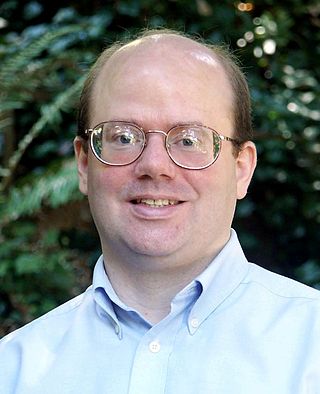
Lawrence Mark Sanger is an American Internet project developer and philosopher who was the editor-in-chief of Nupedia, an online encyclopedia, and co-founded its successor Wikipedia along with Jimmy Wales. Sanger coined the name 'Wikipedia', and wrote many of Wikipedia's early guidelines, including the "Neutral point of view" and "Ignore all rules" policies. Sanger later worked on other encyclopedic projects, including Encyclopedia of Earth, Citizendium, and Everipedia, and advised the nonprofit American political encyclopedia Ballotpedia.
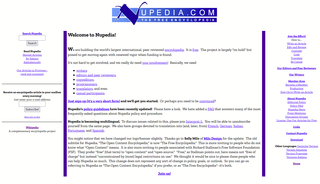
Nupedia was an English-language online encyclopedia whose articles were written by volunteer contributors with appropriate subject matter expertise, reviewed by expert editors before publication, and licensed as free content. It was founded by Jimmy Wales and underwritten by Bomis, with Larry Sanger as editor-in-chief. Nupedia operated from October 1999 until September 2003. It is best known today as the predecessor of Wikipedia. Nupedia had a seven-step approval process to control content of articles before being posted, rather than live wiki-based updating. Nupedia was designed by a committee of experts who predefined the rules. It had only 21 articles in its first year, compared with Wikipedia having 200 articles in the first month, and 18,000 in the first year.

The Wikipedia community, collectively and individually known as Wikipedians, is an online community of volunteers who create and maintain Wikipedia, an online encyclopedia. Since August 2012, the word "Wikipedian" has been an Oxford Dictionary entry.
On April 7, 2010, Larry Sanger, co-founder of Wikipedia, sent a letter to the FBI stating that Wikimedia Commons was hosting child pornography, contrary to Title 18 of the United States Code. His accusations focused on images in the "lolicon" and "pedophilia" categories, the latter of which contained explicit drawings of sexual acts between adults and children by French artist Martin van Maële (1863–1926).

The following outline is provided as an overview of and a topical guide to Wikipedia:

The first edit in Wikipedia's database, to HomePage was made on January 15, 2001, and states in its entirety "This is the new WikiPedia!". In December 2021, co-founder Jimmy Wales announced that he would sell a website containing a re-creation of an earlier edit that he said he made and then later deleted, which contained the text "Hello, World!", to the highest bidder as a non-fungible token (NFT).
















